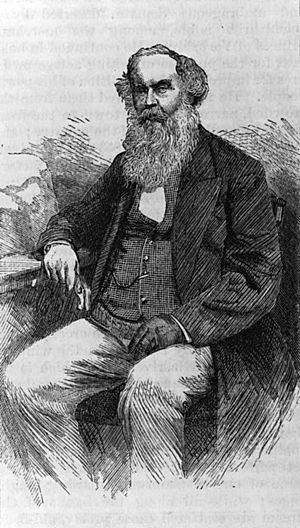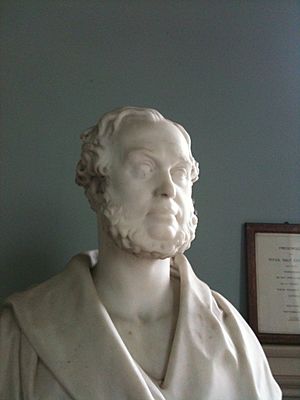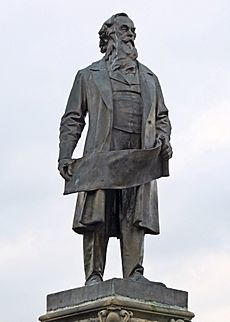Titus Salt facts for kids
Quick facts for kids
Titus Salt
|
|
|---|---|

Sir Titus Salt
|
|
| Born | 20 September 1803 |
| Died | 29 December 1876 (aged 73) Lightcliffe
|
| Spouse(s) | Caroline Whitlam |
| Children | 11 |
Sir Titus Salt (born September 20, 1803, in Morley – died December 29, 1876, in Lightcliffe) was a famous manufacturer, politician, and generous person from Bradford, England. He is best known for building a huge textile factory called Salt's Mill and the special village of Saltaire next to it.
Contents
Early Life and Education
Titus Salt was born in 1803. His father, Daniel Salt, first worked as a drysalter (someone who sells chemicals and dyes) and later became a sheep farmer. His mother was Grace Smithies.
Titus went to school in Batley, possibly Batley Grammar School, and then to another school near Wakefield. From 1813 to 1819, his family lived in Morley before moving to Crofton, near Wakefield.
Building a Business Empire
After finishing school, Titus Salt worked for two years as a wool-stapler in Wakefield. A wool-stapler sorts and grades wool. In 1822, he joined his father's business, Daniel Salt and Son.
Discovering New Wool
The company mainly used Russian Donskoi wool for making woolen cloth. Titus wanted to use this wool for worsted cloth, which is a smoother, finer fabric. He tried to convince other spinners in Bradford, but they weren't interested. So, he decided to start his own spinning and manufacturing business.
In 1836, Titus found some bales of Alpaca wool in a warehouse in Liverpool. Alpaca wool comes from alpaca animals and is known for being soft and shiny. He took some samples to experiment with and then bought the whole lot. He wasn't the very first person in England to work with alpaca, but he was the one who made the beautiful, shiny 'alpaca' cloth popular.
Growing the Company
In 1833, Titus took over his father's business. Within just 20 years, his company grew to be the biggest employer in Bradford.
Sir Titus Salt and Public Service
Titus Salt was a very important person in Bradford. He was the Chief Constable (like a police chief) before Bradford became an official town in 1847. After that, he became a senior alderman (a senior member of the town council).
He was also the second mayor of Bradford, serving from 1848 to 1849. Later, he became a Deputy Lieutenant for the West Riding of Yorkshire, which is a high civic role.
Trying to Clean Up the City
Factories in those days created a lot of smoke and pollution. In 1842, Salt tried to clean up the air using a device called the Rodda Smoke Burner, but it didn't work well.
Becoming a Member of Parliament
In 1848, Salt became a Liberal Member of Parliament (MP). This meant he represented Bradford in the national government. Around 1850, he lost his seat in Parliament.
Creating Saltaire Village
Around 1850, Titus Salt decided to build a huge new mill to bring all his textile factories together in one place. He didn't want to add more factories to the already crowded city of Bradford. So, he bought land about three miles away in Shipley. This land was perfect because it was next to the River Aire, the Leeds and Liverpool Canal, and the Midland Railway, making it easy to transport goods.
In 1851, he started building the model village of Saltaire. A model village is a community built by a factory owner for their workers, often with good housing and facilities.
On his 50th birthday, September 20, 1853, he officially opened Saltaire Mills (now known as Salt's Mill). He then began building houses, bathhouses, an institute (for education and recreation), a hospital, almshouses (housing for the poor), and churches for his workers.
In 1857, Salt became the President of the Bradford Chamber of Commerce, an organization that supports local businesses. From 1858 to 1859, he paid for the building of the congregational church, which is now Saltaire United Reformed Church. He also gave land for the Wesleyan chapel to be built.
Salt did not allow "beershops" (pubs) in Saltaire. However, he himself was not completely against alcohol, even though many people thought he was. He was also a local Justice of the peace and a Deputy Lord Lieutenant.
Titus Salt was a private person and didn't write down why he built Saltaire. But he once told Lord Harewood that he built it "to do good and to give his sons employment."
From 1859 until he retired due to poor health in 1861, Salt served as a Liberal Member of Parliament for Bradford. On October 30, 1869, he was given the special title of Baronet, becoming Sir Titus Salt, 1st Baronet, of Saltaire.
His Family and Legacy
On August 21, 1830, Titus Salt married Caroline Whitlam. They had 11 children together: six sons and five daughters. Many streets in Saltaire village are named after his children.
His children included:
- Sir William Henry Salt (1831–1892)
- George Salt (1833–1913)
- Edward Salt (1837–1903)
- Herbert Salt (1840–1912)
- Titus Salt (1843–1887)
In 1876, Sir Titus Salt passed away at Crow Nest, Lightcliffe, near Halifax. He was buried at Saltaire Congregational Church. It is estimated that over 100,000 people lined the streets for his funeral, showing how much he was respected and admired.
See also
 In Spanish: Titus Salt para niños
In Spanish: Titus Salt para niños
- Joseph Rowntree (philanthropist)
- George Cadbury
- Lever Brothers



